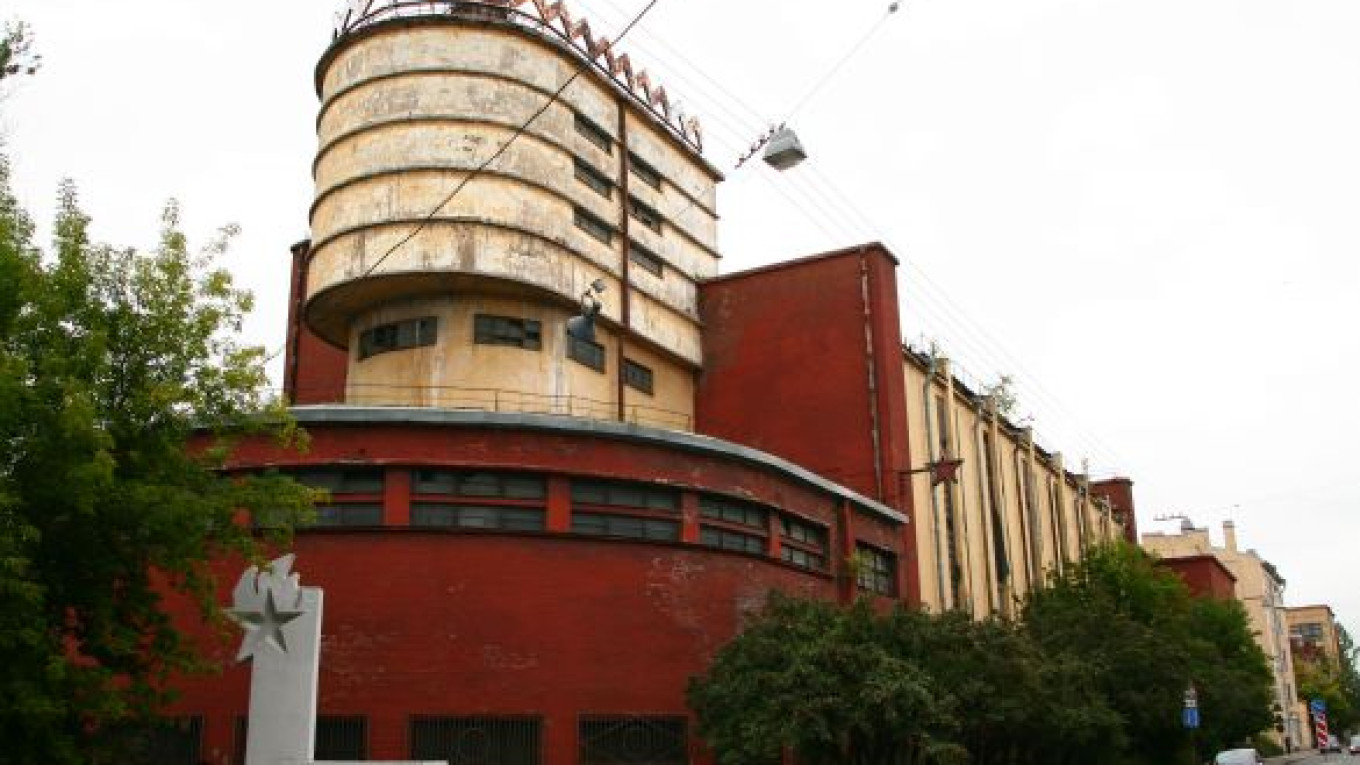ST. PETERSBURG — A dilapidated building in a former textile factory complex in St. Petersburg, designed in the shape of a ship by expressionist German architect Erich Mendelsohn, is set for a second life as a local developer aims to turn it into an international center for arts and culture, like the Tate Modern in London.
Mendelsohn was invited to design the Red Flag Textile Factory by the Bolshevik government in the 1920s when the country was open to architectural experiments. Despite years of neglect, the building, a tugboat-shaped vessel that has somehow found itself lost on land, is still impressive.
Businessman Igor Burdinsky knew nothing of Mendelsohn when he unexpectedly stumbled upon the crumbling masterpiece during a leisurely Sunday morning five years ago.
“I was amazed by the appearance of this highly imposing, constructivist building,” Burdinsky said. “It got under my skin to such an extent that when an opportunity arose to buy it, I agreed immediately, even though it was not for sale separately and I had to buy it as part of a package deal that comprised all the premises of the Krasnoye Znamya Textile Factory.”
Burdinsky’s idea is to create a cultural center in the building alongside commercial and residential real estate.
“This unique space is capable of hosting a huge variety of shows and genres,” he said, “I have often heard that many contemporary artists simply do not have anywhere to exhibit in St. Petersburg because their installations require large spaces, which the city does not have. I am happy to say that things have changed and a venue has appeared.”
Located in the city’s Petrogradsky district, “Mendelsohn’s ship,” as it is known, is the only building in the complex that is recognized as wholly his. Years later, when the architect discovered that it had been actually built according to his designs, he included it in a list of his projects.
The “ship” is essentially the building that housed the factory’s former power station. This space hosted its first art show last December, when Ilya Trushevsky’s media installations were shown in the vast hall inside. Critics have hailed the space as one of the most unique in the city.
Most of Mendelsohn’s bold ideas for the Red Flag complex never actually took shape, as bureaucratic commissions judged them as too extravagant. He was criticized for being given the assignment without a tender and packed his suitcase and left Russia before he ever saw his ship built.
The architect memorably said, “Bureaucrats in Russia are strong enough to destroy anything, right up to the results of the Bolshevik Revolution.”
About $50 million has already been invested in the project, and a further $150 million is needed. Negotiations with potential investors are in progress, says Burdinsky, but the economic crisis has slowed things down.
“The arts center is not the most profitable or attractive part for investors, but it’s certainly the most exciting part of the whole thing for me,” he said.
Burdinsky had British architect David Chipperfield, who is responsible for the Neues Museum in Berlin, come up with a design that will see a contemporary art museum go up next to the power station.
“What appealed to us about Chipperfield in the first place is the unique combination of liberty and tact with which he tackles historic objects,” Burdinsky said.
But Burdinsky still laments the lack of support from local bureaucrats for his ideas.
“I get the feeling that our city is not interested in getting new signature architectural works,” Burdinsky said. “Such things appear to be rather low on the authorities’ list of priorities, as are contemporary art museums, which St. Petersburg, embarrassingly, still has a total lack of.”
A Message from The Moscow Times:
Dear readers,
We are facing unprecedented challenges. Russia's Prosecutor General's Office has designated The Moscow Times as an "undesirable" organization, criminalizing our work and putting our staff at risk of prosecution. This follows our earlier unjust labeling as a "foreign agent."
These actions are direct attempts to silence independent journalism in Russia. The authorities claim our work "discredits the decisions of the Russian leadership." We see things differently: we strive to provide accurate, unbiased reporting on Russia.
We, the journalists of The Moscow Times, refuse to be silenced. But to continue our work, we need your help.
Your support, no matter how small, makes a world of difference. If you can, please support us monthly starting from just $2. It's quick to set up, and every contribution makes a significant impact.
By supporting The Moscow Times, you're defending open, independent journalism in the face of repression. Thank you for standing with us.
Remind me later.


